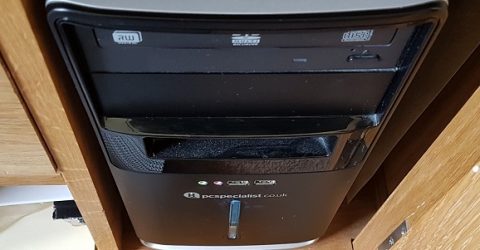How to tell when your PC is about to fail

The demise of a desktop computer can come as a nasty shock if you’re not expecting it.
Desktops are often central to our lives, with many years of documents, user settings and software packages saved onto their hard drives.
And while the cloud has made data backups relatively easy to accomplish, many people will still be discovering things they’ve lost months after disposing of an old computer.
As a result, recognising the signs that a PC is about to fail can give you vital time to salvage as much as you can.
Lost and found
PCs are built using various standalone components, so the demise of one hardware element doesn’t necessarily mean the loss of data.
A GPU failure might prevent files from displaying properly, but they can still be accessed by a machine with a functioning graphics processor.
Even if one input device has stopped working, like a keyboard PS/2 port, it’s possible to drag-and-drop files and folders onto a data key via the mouse.
(The reverse can also be accomplished by tabbing between screens, though it requires familiarity with CTRL-based keyboard shortcuts).
Hard drives may be physically removed from one machine and inserted into another, enabling their contents to be read afresh.
And IT experts can often resolve issues like a failed DVD drive, a memory leak or even malware attacks which might otherwise threaten the integrity of stored data.
However, the impending demise of a motherboard or hard drive is far more critical, and requires immediate action.
The same is true of a catastrophic operating system failure, or even driver conflicts.
Countdown to extinction
Common precursors when a PC is about to fail include unexpected shutdowns, which may be preceded by a blue screen error message briefly appearing.
The opposite is also true. Boot errors and warning messages on startup may suggest Windows is corrupted, there’s a hole in the memory, or the CPU is on its last legs.
Look out for the fan working overtime, suggesting something is overheating – a CPU over temperature error could prevent successful boot-up.
Strange responses to user inputs might suggest malware has got the machine in its grip, such as multiple web browser windows opening or antivirus software reporting critical errors.
Impending hard drive failure can be indicated by slow operation, regular crashes, worrisome noises as the individual disc plates spin, bad sectors or trouble accessing and opening files.
Fail to prepare…
If you think your PC is about to fail and data may be lost, these are the steps we’d recommend taking as a matter of urgency:
- Use your phone to take photographs of key document folders, the desktop, email PSTs, etc. You can refer to these while the computer is off, to decide what to prioritise saving.
- Using another PC, format a data key. These solid state devices rarely corrupt even if file transfers are interrupted midway through, and they offer up to 512GB of storage.
- Transfer files in batches, prioritising the most important documents or folders. This is preferable to transferring them alphabetically and running the risk of losing key files.
- Once you’ve salvaged critical data, think about whether you can transfer other C-drive contents off the PC. Can you export internet bookmarks and email PST folders?
- If you’ve still got time, deactivate any security protocols which might make accessing websites or programs difficult on another device.






